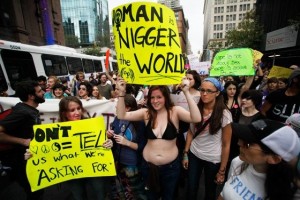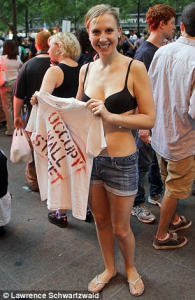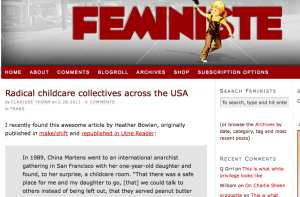It began with two poems.*
I had written “Rip Up the Streets” after weeks of agitation; agitation caused by the Occupation and directed toward the Occupation. His poem, “Wait,” was written in response to critiques of the Occupation, doubt, frustration, pain.
For a month I had been watching, observing, listless and not entirely certain why. I identified as an activist for twelve years and had my share of street activism. Sign holding, marches, chanting, crossing the line, civil disobedience, mind games by police and law enforcement, letter writing, petition signing, globe trotting, conference presenting-attending, proposal writing, grant pleading.
The Occupation, though, was annoying me. I could not precisely say why.
****** Two Weeks Earlier*******

A white woman holds up a sign, “Women is the Nigger of the World” during SlutWalk, a grassroots campaign geared toward raising consciousness about gendered violence. If you want to know more, read up.
I didn’t join the fray. I’d had my fair share of “feminist” movements and moments that proved unsafe, negligent, and downright unjust toward women of color, GLBTQI, transexual, transgender, and non-conforming folks all done in the name of “movement” and “liberal” and “freedom” and “justice.” Most of these acts, however, were White-identified mainstream swimming feminists. Distrust grows with each incident and “What would you have me do?” retorts/excuses.
It was just another brick to add to the wall I had been building about kyriarchal, heteronormative, “liberal” movements that ignore the stratification of power and privilege within the 99%. Moving beyond oppression Olympics, true liberation is about understanding the dynamic of hierarchal powers and its impact in movement building so we can identify, strategize, and create a movement that does not perpetrate the oppression we claim to fight against.
In liberation, there is no “most.” There is only “all.” The responsibility includes critical analyses of existing paradigms and pedagogies of oppression AND how we participate in those models. It is not enough to analyze the interlocking oppressions against marginalized communities, but to be awakened to the ways in which we have accepted and inhabited these practices of hierarchal control and mentalities. The effects of oppression are not just about the oppression of the 1% against the 99%, it’s about the social norms we have adopted within our own communities in effort to gain or secure ourselves at the expense of another person.
There is very little redemption for a movement that would condone using a sign with the very word that means structural, institutional, sinful, systematic oppression. What’s more disturbing is the fallout of that sign. The excuses, the “it’s only one person,” the “we can’t be responsible for every sign” only solidified my belief that many feminists *still* lack comprehensive education around oppression. They don’t get why you don’t use the n-word in a sign. I don’t care if that phrase was coined by Yoko Ono and later used by John Lennon. It’s a fatal literary wound.
If you don’t know why or how race – among many other facets of social stratification and identity – is still an issue today, you’re probably not the best person to publicly hold a sign about who or what women are today. Put your hand down. Don’t volunteer.
I swear there’s something about young White women who feel compelled to dress like it’s the dead of summer and hold up political signs.
“Occupy.”
It should be “DeColonize.”
Why?
Well, read up for yourself on why language is the house of being and it’s more than just picking at semantics.
So, I have a dream about race, feminism, organizing and when I wake up, I write “Rip Up the Streets.” I put it out there for a few activist friends and one of them is in the Occupation. An “occupier.”
He writes me. He’s devastated by my poem. He’s emotionally spent, fatigued, and hurt.
He writes a poem and sends it to me.
We agree to do things the old fashioned way: talk in person.
We meet at my house the next day to hash this out face to face.
I read up before our meeting, trying to put my head in the write space and realize, how much I have grown and changed in my own political identity. 12 years of activism and I know who I trust: my own experiences.
I run Isaiah around in the hours before the meeting, hoping to tire him out and guarantee an afternoon nap. The stove is warming a big pot of nilaga, a Filipino soup/stew with lots of sabao. Knowing those soup bones are in my kitchen, something from my culture, something from me, comforts me.
I stir it gently. I know what I’m about.
Although I’m not sure what H* is going to say, or how he’s going to be, I know that our friendship and mutual respect can frame and contain our differences, however profound they may be.
In my reading, I see that Naomi Wolf is arrested. *eyeroll*
My distrust of the Occupation strengthens. Naomi Wolf.
H* arrives and thus begins the near 3 hour meeting in my living room.
He tells me about the Occupation. What’s happening on the ground.
I tell him about Poor. I share my skepticism based on years of observing, exposure, and a lifetime of unraveling what happens when people get rowdy over personal loss vs. communal love. (e.g. Being motivated because you don’t have a job vs. transforming life habits out of knowledge that poverty exists and and its entirely humanmade)
We share.
I talk about my skepticism about the Madison protests. The media coverage. The precious feelings of the middle-class who may or may not be concerned with anyone or anything else except their own economic security. Or, as better stated:
Black and brown folks have long known that whenever economic troubles ‘necessitate’ austerity measures and the people are asked to tighten their belts, we are the first to lose our jobs, our children’s schools are the first to lose funding, and our bodies are the first to be brutalized and caged. Only we can speak this truth to power. We must not miss the chance to put the needs of people of color—upon whose backs this country was built—at the forefront of this struggle.”
I talk about Grace Lee Boggs and her message of sustainability.
Grace Lee Boggs' message to Occupy Wall Street - 10/9/11 from American Revolutionary on Vimeo.
He tells me about the education going on among the leaders, the need for diverse voices but the all the faces are White.
He asks what his role is as a hetero White male.
I shrug inside. Sometimes I don’t know what my role is as a privileged woman of color. “Lead by listening,” I tell him. “Respect communities of color enough to support them to solve their problems, tell their stories, and use your privilege with grace and generosity. If you want to know more about a person, be in relationship. If you want to know about their culture, go read a book. Lead by listening. Be a man of strength: show your vulnerability and how hard it is to live against the grain. Endure this.”
He thinks for a minute, “And I know that when I enter a room, I am a symbol of that oppression. And I know it’s not your responsibility or anyone’s responsibility to educate me.”
Right.
Welcome to the cruelty of white supremacy. See, for a long time, White people thought that it’s only people of color who cry racism when something’s wrong or when they want to even out the playing field. Not true. The effects of a system and nation dependent upon White supremacy runs deep in all of us. It not only feeds the legislation that criminalizes and kills the poor and marginalized, it feeds inferiority complexes and thwarts the human dignity of ALL. It robs us ALL of the gifts of people of color, and it dilutes and compromises the potentially rich relationship that can exist between people of difference. It’s not just about White people get everything, give me some. Racism is about loss. Deep, unretrievable loss. Loss of relationship, and its place, an illusion of sameness and control kept alive by unjust legislation and corrupt institutional powers.
We go deeper.
We talk about power, power dynamics within activist circles, gendered violence, the midwest and its (un)fruitful garden of support for alternative living. H* shares his career plans to go into community health, to go to medical school and use health as his foundation to encompass his passion for social justice.
He rubs his eyes and suddenly I am overwhelmed by the world, brought in through my front door on a blustery fall day. “What about you?” he asks.
I want to laugh, “Yes, what about me…”
“I can’t fly around the globe anymore, nor do I want to. I don’t want to go sleep on a sidewalk because I don’t believe that, at this point, that’s the best use of my purpose and presence. My concept of activism has changed, radically, as a mother, and I have yet to see the life of activism modeled for those of us who are not single or child-less. A family of activists is still a novel concept. We’re bound to each other and the Occupation keeps encouraging us to get out there and take space. Believe me, I am taking more space as a writer and minister than I can as an occupier.”
We dig deeper.
We talk about isolation, mental health, families of origin, nation-state, and what the United States may look like in two generations.
As we head past the second hour, my stomach growls, yet I don’t feel hungry. It felt appropriate on so many levels, like our hunger and thirst for justice took on a physiological state.
We never got to the nilaga. Just embraces and “you’re good for me” words muffled into each others’ shoulders.
Perhaps this is the face of change, of activism spurred by difference and led by openness. Hours in a living room, talking fervently in hushed voices so not to wake my sleeping child.
_____________________________________________________________________
*Rip Up These Streets
This land was not discovered,
it was TAKEN –
and in the taking of land
there was taking of lives, of women’s bodies
blood
was taken
to drink in the name of Christopher,
for who we
so ignorantly rejoice
and give favor
for murder, rape, and theft.
A hol(y)-day
of all things
we give to him.
A hol(y)-day
to do nothing,
to rest from labor and disturbance.
A day rooted
in the most evil disturbance
imaginable.
This SOIL. This LAND.
Is. Not. Ours.
And it’s not ours to claim to occupy –
or RE-Occupy.
Rip up these streets
The word Occupy is being used to
“instigate”
“agitate”
“educate”
but these roads were in need of cleansing
long before a “movement” of the 99%
We
of all people
who live on stolen ground
should know better than to cry
OCCUPY!
in the name of justice
Rip up these streets
OccupyNothing
OR
Occupy your mind
– listen –
to the lives
of the preyed and eaten,
not the lion’s tale –
the victor’s tale.
OccupyNothing
because it’ll take more than occupation
to transform a culture
a society
a nation
a life
Rip up these streets
and remake these pathways
with grass more livable
than concrete
with a plan more sustainable
than agitation
Rip up the streets in our hearts
that seek to fight the powers
because we want more
power for ourselves
MORE
MORE
MORE
Rip up the streets in our minds
which seek “fair and just”
for many
but ignore
those even more marginalized
and push them further out
to the isles of oppression
There is something more true than
Occupy
Rip up these streets
and DeColonize.
Your Self.
_______________________________________________________________________
H*’s poem which was written in response.
Wait
WAIT
Wait, they say.
Wait until the powerful willingly give up their power.
Wait until the time is right.
Wait, they say, until I finish my thesis,
in which I craft the perfect theory
of the perfect movement.
Wait.
Until then, they say, be silent.
Be silent about the pains you have felt.
Be silent about the suffering you have seen.
Be silent, they say, about all that is hurting in this world.
Be silent, they say,
and wait.
Do nothing, they say, until all is perfect.
Do not speak to your neighbors about the injustice you have seen and felt.
Do not have conversations about oppression and hierarchy.
Do not express your discontent with the status quo, they say, until all is perfect.
Until all is perfect, they say,
be silent and wait.
WAIT, THEY SAY.
Wait, they say, while prisons fill.
Wait, they say, while schools empty.
Wait, they say, while our minds and hearts and souls are corrupted by the oppressive structures of our society.
BE SILENT, THEY SAY.
Be silent, they say, while inequality grows.
Be silent, they say, while the powerful consolidate their power.
Be silent, they say, while everything we love and cherish and value is thrown into the fire.
DO NOTHING, THEY SAY.
Do nothing, they say, while the very earth groans beneath our feet.
Do nothing, they say, while hopelessness consumes those you love.
Do nothing, they say, while the future is lost.
This, my sisters and brothers, is how the oppressor turns us against one another.
This, my sisters and brothers, is how we tear each other down.
This, my sisters and brothers, is how those precious embers of hope that glow faintly in our hearts, those embers that allow us to believe, if only briefly, that a better world is possible, those embers that are at the very core of our humanity.
This is how those embers are snuffed.


